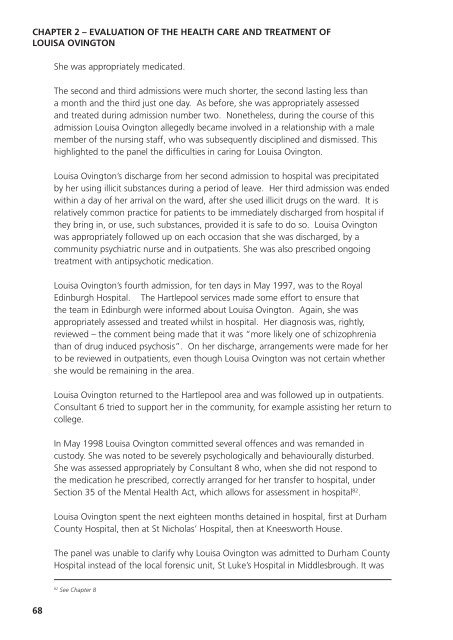Lousia Ovington independent investigation report ... - NHS North East
Lousia Ovington independent investigation report ... - NHS North East
Lousia Ovington independent investigation report ... - NHS North East
You also want an ePaper? Increase the reach of your titles
YUMPU automatically turns print PDFs into web optimized ePapers that Google loves.
CHAPTER 2 – EVALUATION OF THE HEALTH CARE AND TREATMENT OF<br />
LOUISA OVINGTON<br />
68<br />
She was appropriately medicated.<br />
The second and third admissions were much shorter, the second lasting less than<br />
a month and the third just one day. As before, she was appropriately assessed<br />
and treated during admission number two. Nonetheless, during the course of this<br />
admission Louisa <strong>Ovington</strong> allegedly became involved in a relationship with a male<br />
member of the nursing staff, who was subsequently disciplined and dismissed. This<br />
highlighted to the panel the difficulties in caring for Louisa <strong>Ovington</strong>.<br />
Louisa <strong>Ovington</strong>’s discharge from her second admission to hospital was precipitated<br />
by her using illicit substances during a period of leave. Her third admission was ended<br />
within a day of her arrival on the ward, after she used illicit drugs on the ward. It is<br />
relatively common practice for patients to be immediately discharged from hospital if<br />
they bring in, or use, such substances, provided it is safe to do so. Louisa <strong>Ovington</strong><br />
was appropriately followed up on each occasion that she was discharged, by a<br />
community psychiatric nurse and in outpatients. She was also prescribed ongoing<br />
treatment with antipsychotic medication.<br />
Louisa <strong>Ovington</strong>’s fourth admission, for ten days in May 1997, was to the Royal<br />
Edinburgh Hospital. The Hartlepool services made some effort to ensure that<br />
the team in Edinburgh were informed about Louisa <strong>Ovington</strong>. Again, she was<br />
appropriately assessed and treated whilst in hospital. Her diagnosis was, rightly,<br />
reviewed – the comment being made that it was “more likely one of schizophrenia<br />
than of drug induced psychosis”. On her discharge, arrangements were made for her<br />
to be reviewed in outpatients, even though Louisa <strong>Ovington</strong> was not certain whether<br />
she would be remaining in the area.<br />
Louisa <strong>Ovington</strong> returned to the Hartlepool area and was followed up in outpatients.<br />
Consultant 6 tried to support her in the community, for example assisting her return to<br />
college.<br />
In May 1998 Louisa <strong>Ovington</strong> committed several offences and was remanded in<br />
custody. She was noted to be severely psychologically and behaviourally disturbed.<br />
She was assessed appropriately by Consultant 8 who, when she did not respond to<br />
the medication he prescribed, correctly arranged for her transfer to hospital, under<br />
Section 35 of the Mental Health Act, which allows for assessment in hospital 82 .<br />
Louisa <strong>Ovington</strong> spent the next eighteen months detained in hospital, first at Durham<br />
County Hospital, then at St Nicholas’ Hospital, then at Kneesworth House.<br />
The panel was unable to clarify why Louisa <strong>Ovington</strong> was admitted to Durham County<br />
Hospital instead of the local forensic unit, St Luke’s Hospital in Middlesbrough. It was<br />
82 See Chapter 8
















